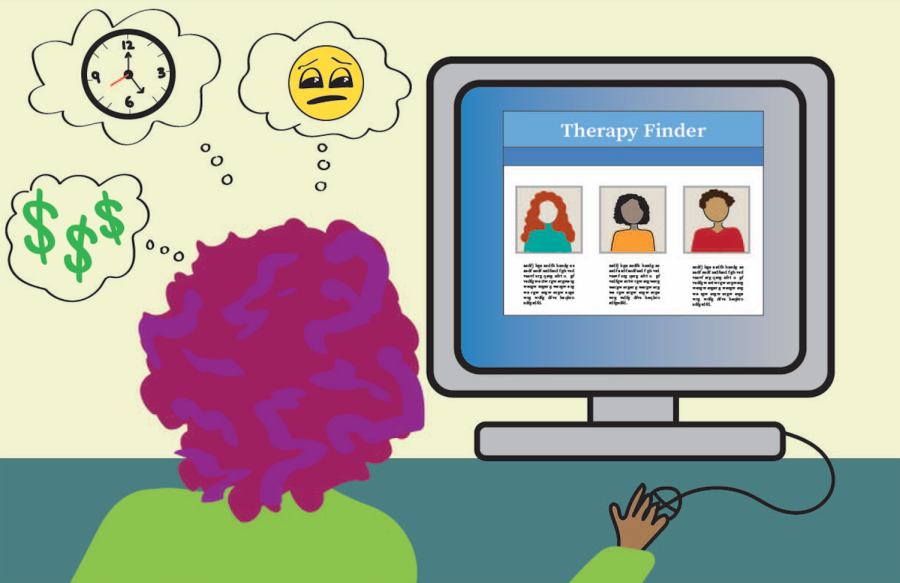Start therapy before you feel you need it
November 7, 2022
Content warning: discussion of mental illness, disordered eating
Overcoming my fear of therapy before reaching a mental health crisis was the best thing I ever did for my mental wellbeing.
Therapy is expensive, time-consuming and difficult to find, but it is also life-changing and sometimes life-saving.
Starting therapy before you feel you desperately need it can give you a strong support system and foundation to get help when your mental health does really falter.
I had considered going to therapy for years.
I knew I needed it—I was diagnosed with generalized anxiety disorder in middle school and was depressed throughout high school. However, whenever I was in the middle of a mental health crisis, I could never seem to bring myself to seek help.
I always talked myself out of getting help when I needed it most. If I went to therapy, I would have to admit to others that I was struggling, so I avoided going even though I knew I needed it.
I wasn’t alone. In 2020, only 46.2% of people with mental illnesses received mental health services, according to the National Institute of Mental Health.
The stigmatization of mental health issues got to me. I didn’t want to admit that things were as bad as they were, and I wanted to be able to handle it on my own.
I also did not want to put that financial burden on my family.
On average, therapy costs $100 to $200 per session, according to Psychology Today, though pricing can also depend on the use of health insurance, which can bring costs down.
I figured the price was more than my family could handle, and in my mind, solving my mental health issues was not worth that cost.
Despite this, I overcame my worries and started going to therapy a few months ago.
My mental health was in a better place than it had been before, so I didn’t talk myself out of it this time.
Before going, I had initially questioned whether therapy was really worth it. If my mental health was in a good place, I didn’t want to waste money or time on something when I didn’t really need it. In the end, though, I decided to give it a try.
However, after only a few weeks of therapy, my mental health took a turn for the worse.
My anxiety got significantly more severe and began inhibiting my ability to eat. I was experiencing panic attacks any time I tried to eat and I started to have physical symptoms, such as constantly feeling faint from not eating and feeling like I couldn’t breathe out of nowhere.
Thankfully, I already had the beginnings of a support system set up in therapy.
I believe that if I hadn’t started therapy before this occurred, my mental health would be significantly worse now, and I may have talked myself out of getting help again.
Therapy helped me to work on coping strategies and grounding exercises and gave me an outlet to talk about what I was experiencing free of judgment.
I had a support system. I didn’t have to handle things all by myself anymore.
Unfortunately, this is not a privilege that everyone has due to the difficulties of finding therapy that is available, accessible and inexpensive.
The availability factor has only been amplified by COVID-19. The American Psychological Association found that 70% of psychologists said their waiting lists grew longer after the pandemic, according to an Oct. 29 Washington Post article.
However, if you have the privilege of accessing therapy I would strongly recommend taking advantage of it.
It can be beneficial for people to seek therapy before they face a mental health crisis so they can be better prepared to handle a crisis when it occurs, according to a May 18, 2021 Healthline Article.
Getting therapy before you need it is all about prevention.
The skills you learn in therapy can help to prevent a crisis from occurring because you are actively developing the necessary skills to keep your mental health in a good place.
If you do experience a mental health crisis, you will have a way to learn the skills you need to cope with it and improve. No more Google rabbit holes trying to figure out how to cope on my own.
For those who don’t have the privilege of consistent therapy at a private practice, UVM’s Counseling and Psychiatry Services could be a good start for finding alternatives.
CAPS offers short-term, individual therapy sessions for free either in-person or through Telehealth for all full-time students.
Although CAPS may be short-term, it can be a great way to start prioritizing the search for a therapist and to begin building coping skills that could be helpful in the future.
Although I am still in the midst of my mental health crisis, therapy has become an amazing resource for me in my work toward getting better, and I can’t imagine going through this without it. My only regret is not starting sooner.
